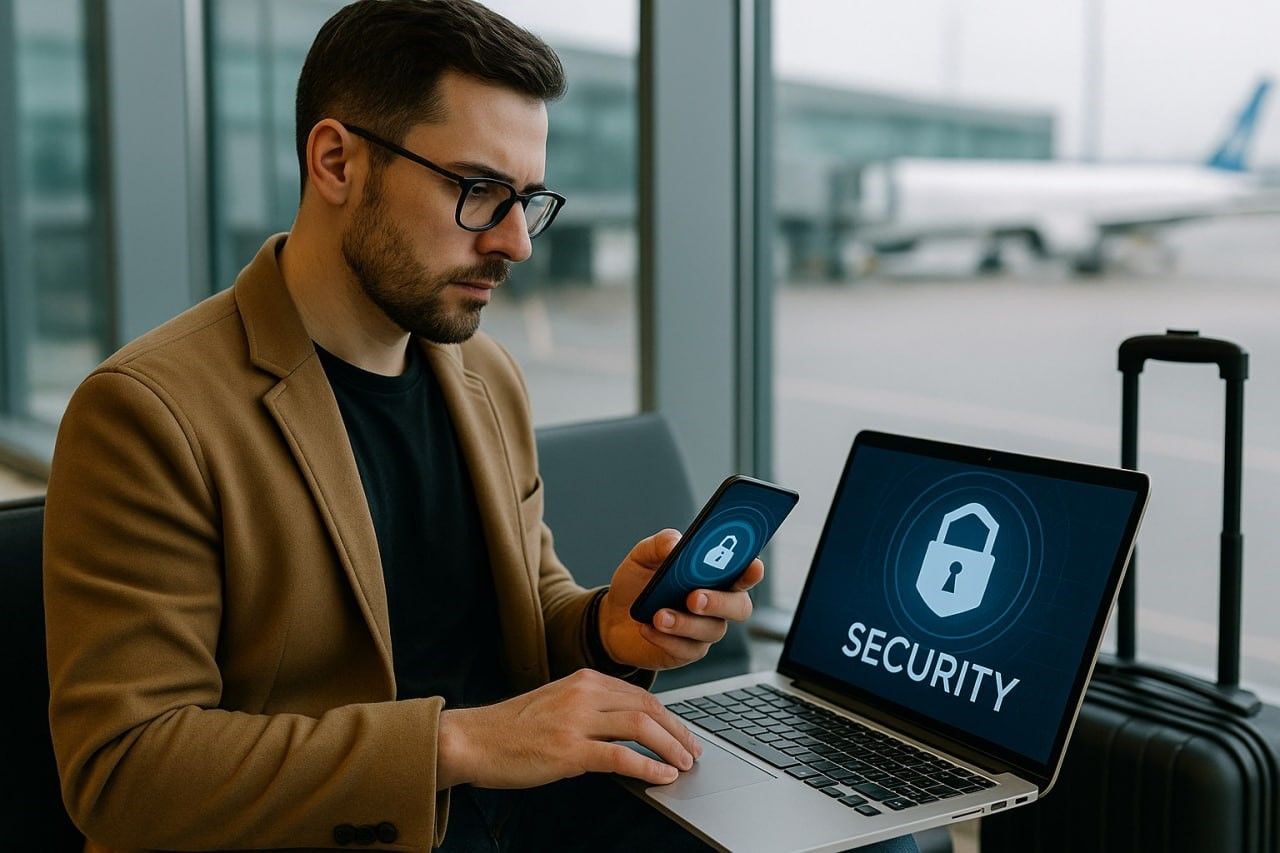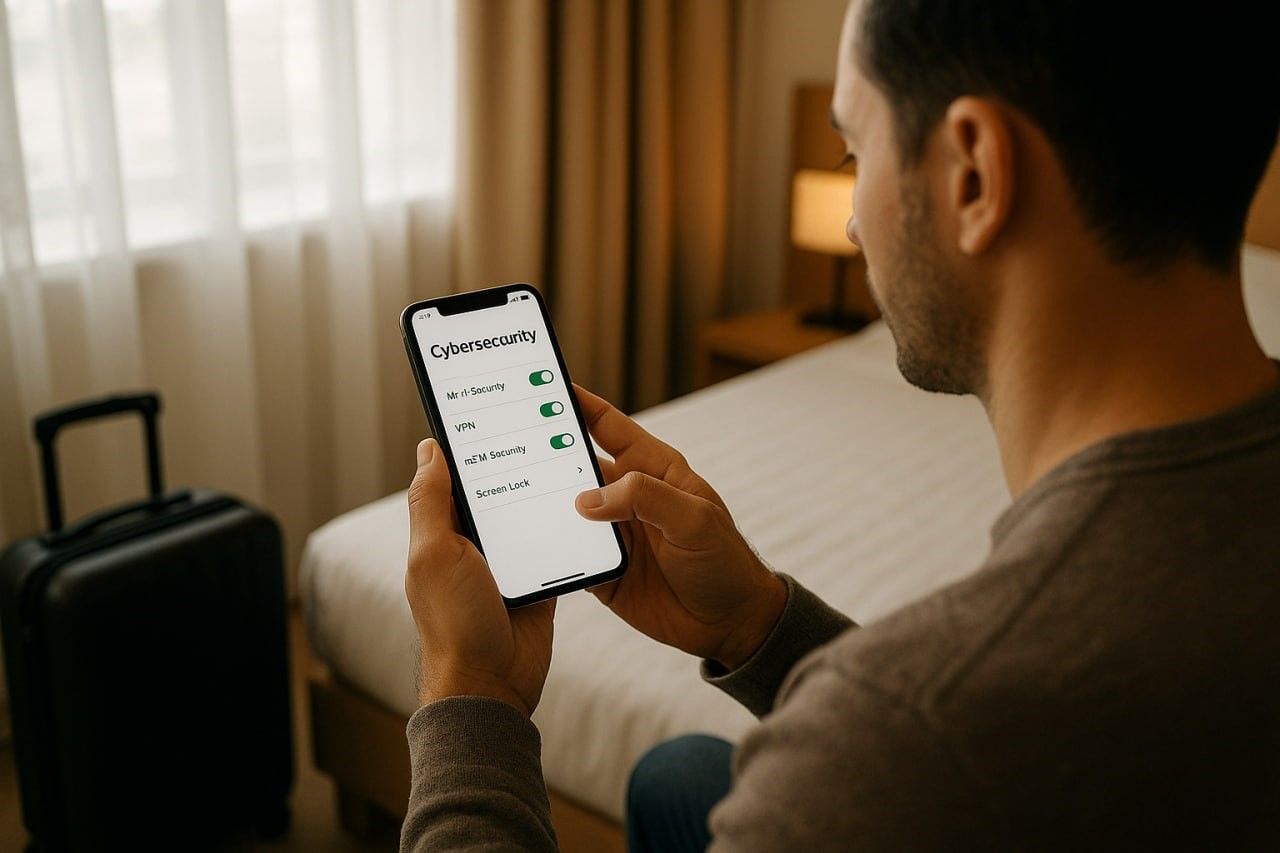Using an eSIM while traveling is one of the simplest ways to boost your cybersecurity abroad, especially when compared to high-risk habits like relying on unsecured public Wi-Fi networks. With the right approach, you can keep your secure travel data protected while navigating airports, cafés, hotels, and international transport systems. If you’re preparing for an upcoming trip and want a safer way to stay online, explore flexible what is an eSIM card options designed to give you private, reliable connectivity worldwide.

Why Travel Cybersecurity Matters More Than Ever
Global travelers, digital nomads, and remote professionals rely heavily on internet access while abroad. But each time you join a new network, your personal information becomes more vulnerable. Hackers often target airports, hotels, cafés, and public transit—places where people habitually log onto unsecured networks without thinking about the consequences.
This is where strong travel cybersecurity tips and smarter mobile habits make a real difference. Using an eSIM provides a private network connection, significantly reducing public Wi-Fi risks and helping you avoid the data theft that often occurs on shared or cloned networks. With your own mobile data plan, you’re less dependent on unknown networks, which means fewer opportunities for your information to be intercepted.
When paired with responsible browsing practices and optional tools like a VPN, your eSIM becomes a key part of a robust, secure setup for international travel.
Is an eSIM Secure When Traveling Abroad?
If you’re wondering is eSIM secure compared to a physical SIM card? the answer is yes—often more so. eSIMs are built directly into your device, meaning there’s no removable part that can be stolen, swapped, or tampered with. This eliminates several classic SIM-based attacks and boosts your overall device security.
Key advantages of using an eSIM for safer travel
- Reduces reliance on unsecured public Wi-Fi
- Prevents physical SIM theft or SIM swap attacks
- Offers encrypted connections through mobile networks
- Simplifies switching between regional data plans
- Pairs well with VPN and eSIM strategies for even greater protection
If you want to compare how mobile data plans work or explore additional features for international travel, you can also check out how Yoho Mobile works.
Authoritative external resources such as the GSMA site and cybersecurity advisories from reputable tech organizations provide helpful background on mobile network safety and SIM technology.
How a Mobile Network Reduces Public Wi-Fi Risks
Many travelers underestimate how dangerous public Wi-Fi networks can be. Even when they appear legitimate, airports and cafés are prime locations for hotspot spoofing—where hackers create fake networks to trick you into connecting.
With a mobile plan, you can avoid these traps altogether. Your secure travel data stays protected because cellular networks encrypt your connection by default. This closed-channel access dramatically lowers your risk exposure since your device bypasses all shared routers and unknown access points.
Examples of common public Wi-Fi threats
- Fake hotspot impersonation: Attackers mimic real networks to capture passwords and browsing data.
- Packet sniffing: Hackers monitor unencrypted data flowing through shared networks.
- Man-in-the-middle attacks: Criminals intercept communication between your device and a website.
- Malicious portals: Fake login screens steal credit card or account details.
By using an eSIM-based mobile plan—even temporarily—you eliminate the need to connect to these risky public networks. It’s one of the most practical travel cybersecurity tips you can adopt.
Step-by-Step: How to Use an eSIM to Improve Travel Cybersecurity
While an eSIM already adds security by replacing physical cards, you can strengthen your protection even more with good travel habits. Here’s how to get started.
-
Install Your eSIM Before Departure
Setting up your plan before you arrive ensures you can bypass airport Wi-Fi completely. Just scan your QR code or follow the activation steps inside your device settings.Installation Tips
- Complete the process while connected to a trusted home network
- Avoid downloading sensitive apps on public networks
- Save your eSIM settings and activation details offline for safety
-
Prioritize Mobile Data Over Public Wi-Fi
Once abroad, rely on your eSIM’s mobile connection whenever possible. This reduces exposure to public Wi-Fi risks and keeps your secure travel data away from unverified routers. -
Use a VPN When Necessary
While mobile networks are inherently more secure, pairing your connection with a VPN adds another layer of protection. This is particularly helpful when accessing banking apps or logging into important accounts. The combination of VPN and eSIM delivers privacy without sacrificing speed. -
Disable Auto-Join Wi-Fi Features
Your device may try to connect to previous networks automatically. Turn this feature off so you don’t accidentally join unfamiliar hotspots while traveling. -
Keep Device Security Updated
Make sure your phone’s operating system and security patches are up to date. This strengthens your eSIM security as well, since the eSIM’s functionality depends on secure device firmware.
Once you’ve adopted these habits, using your mobile data becomes one of the safest ways to stay online during your trip. And if you want reliable data from the moment you land without dealing with physical SIM cards, you can choose a trusted eSIM provider that keeps your safety a priority. If you want to travel with confidence, you can get a Yoho Mobile international eSIM and stay protected wherever your journey takes you.

Real Travel Scenarios Where an eSIM Enhances Security
Let’s look at some real-world examples to understand how your eSIM helps create a secure online environment while overseas.
Airport Transit
Airports are hotspots for cyberattacks. By relying on mobile data instead of guest Wi-Fi, you avoid risky login portals and fake access points designed to capture traveler data.
Ridesharing and Navigation
From booking rides to following map directions, mobile networks keep your location data and travel patterns private. This helps ensure safe routing without exposing sensitive information on open networks.
Hotel Check-Ins
Hotels frequently use shared routers and outdated security systems. Keeping transactions on your mobile data—especially when confirming payment details—adds a valuable layer of protection.
Remote Work While Traveling
Digital nomads who handle client files or login credentials can avoid a major security breach simply by avoiding public Wi-Fi. A secure eSIM connection ensures that your work stays private, even in coworking cafés or crowded spaces.
Frequently Asked Questions: Cybersecurity and eSIM Use
Is eSIM secure enough for international travel?
Yes. eSIMs enhance security by eliminating removable parts and reducing your exposure to risky networks.
Can I still use Wi-Fi with an eSIM?
Yes, but it’s safer to rely on mobile data. When Wi-Fi is necessary, use a VPN to reinforce safety.
Are mobile networks safer than hotel Wi-Fi?
Generally, yes. Mobile networks encrypt your connection and aren’t shared with random users.
Do I need a VPN if I’m already using mobile data?
A VPN is optional but helpful for sensitive accounts or professional tasks.
How does an eSIM help with identity theft risks?
By avoiding Wi-Fi traps and preventing SIM tampering, an eSIM reduces attack points often exploited by cybercriminals.
Key Takeaways for Safer Digital Travel
- Using an eSIM is one of the most effective travel cybersecurity tips
- Mobile data dramatically reduces public Wi-Fi risks
- eSIMs offer built-in protection against physical tampering
- Pairing VPN and eSIM use strengthens privacy even further
- A private mobile connection keeps your secure travel data safer abroad
Conclusion
Your cybersecurity abroad is only as strong as the networks you rely on, and an eSIM gives you a secure, private connection that keeps your information safe from the most common travel threats. To protect your data while exploring the world, get a Yoho Mobile international eSIM and stay connected with confidence.
